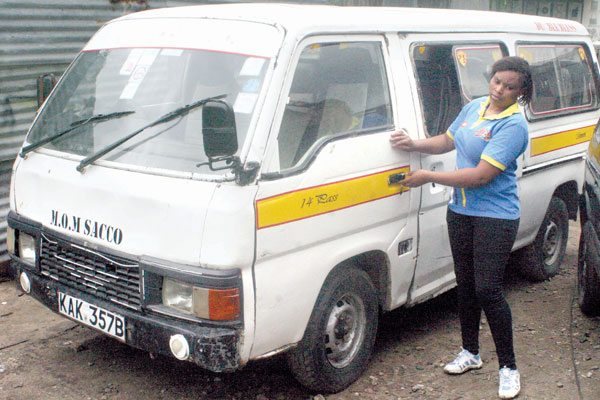Pesh Wanjiru’s life was turned upside down by the 2007/2008 post election violence and all she was left clinging to was hope.
As the raging inferno gutted their home at Burnt Forest near Eldoret to ashes, Wanjiru saw her dream of a good future vanish with the flames.
By then she was only 21 and a single mother to a two-year-old boy- John Levis. In the search for peace and a better future Wanjiru, or Shiro as she is commonly referred to, fled to Mombasa, leaving behind her family, who had sought refuge at an IDP camp near Eldoret showground.
A friend at Mishomoroni area took her in and she got a job as a waitress where she was being paid Sh80 per day. But today Wanjiru is success story.
After enduring insurmountable odds the 29-year-old woman is a proud owner of a certified PSV matatu. How she successfully waded through the quagmire of financial challenges that stood in her way can be summarised by the English proverb- the darkest hour is just before dawn.
“When I came to Mombasa, my friend took me to one of her acquaintances who used to operate an eatery near Mishomoroni. I started working there from 6.00 am to 7.00 pm, earning Sh80 per day,” says Wanjiru.
Majority of her customers were matatu crew plying the Kisauni -Bamburi and Mishoroni routes and they would encourage her to join them. Her salary at the food kiosk was gradually increased from Sh80 to Sh150 per day. She later enrolled in a chama and begun saving.
“I used to remit all the Sh150 to the chama. In the first round I received Sh5,000. I decided to start life on my own and so I rented a house where I used to pay Sh1,000 as rent.
I was even given a mattress by a friend,” Wanjiru recalls and adds that after she had fully settled she used part of her savings to start a vegetable kiosk in Mishomoroni, before she got in touch with another friend, a tout in Bamburi, Kisauni and decided to get into the industry.
Wanjiru says she endured difficult times in the process of familiarising herself with the new job, perceived as a men’s preserve. “The training itself was tricky and required immense courage and patience. My male colleagues at first riduculed me.
It was challenging at the beginning. I would charge passengers as they enter the matatu. I did not understand that the rule is that passengers should take their seats first before I begin charging them. However, I managed to catch up slowly and started realising the benefits.
In the first day as a tout I pocketed Sh350 within three hours and realised that the job was well paying,”she says. Wanjiru became even more motivated after she once got a chance to work for the whole day and managed to pocket Sh1,950 a day.
“Most people always see women who work in the matatu industry as people with loose morals and we are therefore disrespected. Some will think that we are in the industry because we are desperate for men. Others openly abuse us just because we are women.
On several occasions men have asked me to quit the job and become their concubine but I rejected their offers,” she says. In 2014 she joined Coastal Shuttle buses that ply the Mombasa town-Mishomoroni route. This was her turning point.
“At Coastal Shuttle we were given Sh200 for lunch daily and a full salary at the end of the month. I decided to start saving. I would spend Sh50 for my lunch and save Sh150 daily in a separate account and when my savings grew to Sh5,000 I enrolled for a driving course,” she explains.
The passionate tout says colleagues in the industry noticed her determination and advised her to invest in the matatu sector. “The friends linked me with sellers of second hand matatus,” says Wanjiru and adds that in September 2014 she purchased her first matatu at Sh270,000.
For three months she operated the matatu, which plied the Mishomoroni- Kengeleni route. “I was still on duty with my uniform when I bought the matatu and sealed the agreement. Even the person who was selling the vehicle could not believe his eyes,” Wanjiru says.
Five months later she sold off the matatu at Sh320,000 and purchased another 14 seater matatu for Sh350,000. Wanjiru says she is planning to purchase another one soon. On a good day, she pockets around Sh4,500 and Sh3,000 to Sh 3,200 on a dry day.
“Besides my business I’m still working at Coastal Shuttle. I employed the colleague who connected me with the seller of the matatu to be in charge of my business,” Wanjiru says.










Very encouraging